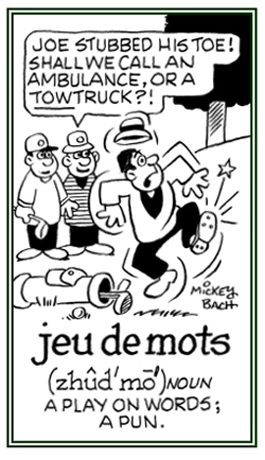You searched for:
“old french”
Units related to:
“old french”
(Old French: look at, consider, think of; from guard, to heed)
(Greek > Latin > Old French: swift animal)
(a suffix which forms nouns that refer to people who regularly engage in some activity, or who are characterized in a certain way, as indicated by the stem or root of the word; originally, which appeared in Middle English in words from Old French where it expressed an intensive degree or with a pejorative or disparaging application)
(Greek: khorde, "gut string" [of a lyre]; used in an extended sense to mean "sinew, flexible rod-shaped organ, string, cord"; Latin: chorda, "related notes in music, string of a musical instrument, cat-gut" via Old French, corde, "rope, string, twist, cord")
(Greek -issa > Late Latin -issa > Old French -esse > Middle English -esse: a suffix that forms nouns meaning a female +++, as in lioness, tigress, heiress, hostess, and sculptress)
(Latin: fruit; from Old French fruit, from Latin fructus, "fruit, produce, profit" from frug-, stem of frui, "to use, to enjoy".)
(Greek > Latin > Old French > French: pretended ignorance; saying the opposite of what a person really means)
(Latin: originally galbinus, "greenish yellow" related to galbanus, "yellow" then formed with the intrusive d; from Old French jaunice, jaunisse from jaune, "yellow")
(Latin: mantellum, cloak, veil; by way of Middle English, from Old English mentel and from Old French mantel; resulting in English words about: mantle, mantel, and manteau)
(Middle English, from Old French mineral from Middle Latin minerale, "pertaining to mines", from minera, "mine")
(Latin: musum, "muzzle, snout"; Old French muser "to meditate, to ponder", perhaps literally "to go around with one's nose in the air" from muse "muzzle, snout")
(Greek: papyros > Latin > Old French; papyrus, an Egyptian rush [a reed plant] from which material was made for writing or drawing. Used in the sense of "fibrous material on which to write or to draw"; paper)
(Greek > Latin > Old French: passageway, used primarily as "a pore, a small orifice"; opening; cavity, tract)
(Latin: crooked, crookedness; perverted, vicious, wicked; borrowed through Old French depraver or directly from Latin depravare, "to corrupt"; from de, "completely" + pravus, "crooked")
(Latin > Old French > Middle English: well known, skillful, neat, elegant)
(Greek > Latin > Old French: Greek skorpios, Latin scorpionem, Old French scorpion; poisonous animal related to the spiders)
(Latin: borrowed from Old French saison, seison, "a sowing, planting", from Latin sationem, "a sowing"; also in Latin, "time of sowing, seeding time.")
(Latin: from Old French seculer; from Late Latin sæcularis, worldly, living in the world, not belonging to a religious order; from saecularis, pertaining to a generation or age; from saeculum, saeclum, period of a man's life, generation; period of a hundred years)
(Latin: betrothed man, groom; betrothed woman, bride; both come from sponsus, past participle of spondere, "to promise, betroth" from Old French, espous [masculine, male]; espouse [feminine, female])
A unit at Get Words related to:
“old french”
(Old French: oblique, slant; prejudicial, prejudiced)
Word Entries at Get Words containing the term:
“old french”
1. jeu d'esprit (zhuh duh-spree) (s) (noun), jeux d'esprit (pl)
A witty, and often lighthearted, comment or composition: The term jeu d'esprit is a cleverness that is used when writing literature.
2. jeu de mots (zhuh duh moh) (s) (noun), jeux de mots (pl) The humorous use of words or phrases: A jeu de mots is an intelligence game of wits or a general term for charades, puzzles, tongue twisters, quizzes, etc.

© ALL rights are reserved.
Go to this Word A Day Revisited Index
3. jeu de paume (zhuh duh-pohm) (noun) (not countable): Formerly a term for lawn tennis: Jeu de paume, originating in France, is a ball-and-court game, which was placed first with the hand and later with a racquet.
4. Etymology: literally, "palm game".
2. jeu de mots (zhuh duh moh) (s) (noun), jeux de mots (pl) The humorous use of words or phrases: A jeu de mots is an intelligence game of wits or a general term for charades, puzzles, tongue twisters, quizzes, etc.

Go to this Word A Day Revisited Index
so you can see more of Mickey Bach's cartoons.
3. jeu de paume (zhuh duh-pohm) (noun) (not countable): Formerly a term for lawn tennis: Jeu de paume, originating in France, is a ball-and-court game, which was placed first with the hand and later with a racquet.4. Etymology: literally, "palm game".
This entry is located in the following unit:
Words of French origin
(page 5)
